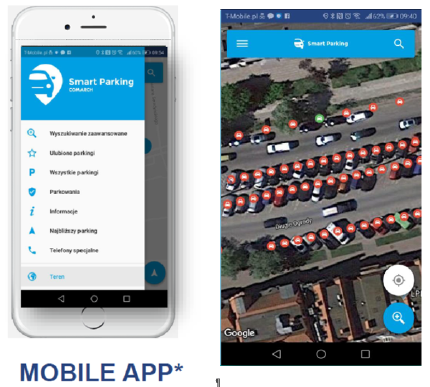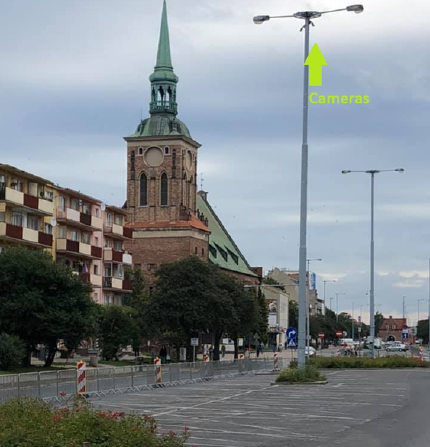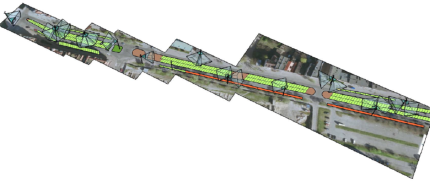Gdansk strategy plan
The baseline assumption for the Action Plan for Gdansk FUA was not to contradict with the strategic documents which are now in place. The approach was to search for connections and synergies. Additionally, SUMP for Gdansk was prepared in parallel, a document which have a major impact on wide range of action regarding mobility in Gdansk and was coordinated with Action Plan. In summary, Gdansk Action Plan focuses on the measures which connect and act as complementation for different strategic projects and policies and has been based on the following priorities:
Action I - Modernization – searching for new technologies, including smart parking solutions which will be tested in one of the pilot action in SOLEZ project.
Action II - Completion – in various meanings such as completion of paid parking zones, completion of the bicycle route network and public transport connections, completion of semi-public/private spaces which are used as free parking spaces, better local regulation for road cleaning.
Action III - Expansion - enlargement of P&R car parks idea, expansion of paid parking zones, increase the number of bicycle and public communication users, expansion of Tempo 30 Zones and Pedestrian Only Zones.
Action IV - Monitoring – monitoring, analysis and better use of data from the communication routes (ITS), developing the network of certified emission detectors, enforcing the controls by the Police on exhaust emissions.
Action V - Limitation – aiming at restricting accessibility for cars in selected zones by remodeling the public spaces, increasing enforcing of road regulation while providing alternatives and improving the quality of public spaces;
Action VI - Prototyping - testing new solutions and new arrangements in public spaces, introducing temporary traffic organizations in order to experience the public spaces differently, especially to limit the domination of parked cars in public space.
Action VII - Information and education - both for the road administration and open public, close cooperation with the areas stakeholders.
Action VIII - Promotion and advocacy for better regulations - aiming at increasing awareness and knowledge; playing an active role in consultations.
Expected impact and benefits of the strategy
Better awareness of emission sources within different target groups. Better parking regulation in the inner city and improvement of management of public spaces dedicated to different road users - different mobility mode users. While in the long-term aiming for implementation of Low Emission Zone as required by Polish law.
Lessons learned
The Gdansk SOLEZ Action Plan is a document which facilities the change for decreasing the impact of individual transport in emission intake and better valorization of urban space. Using the experiences of other partners allow to implement new solutions and methodology.
It is vital to acknowledge the background scenario of the law regulations in Poland. Under the Polish law, at the time of preparing the Action Plan, it was not possible to implement a Low Emission Zones, which were already established in European countries i.e. Germany. The Polish national law was introduced in 2018 (updated). Unfortunately, the proposed law solutions needs further development since the organizational burden (changing spatial plans) for the community will not allow fast implementation.
SMART PARKING PILOT ACTION
Reshaping of the parking scheme of Długie Ogrody Street
The Gdańsk smart parking pilot action aimed at providing data for long-term decision-making and reshaping of the parking scheme in Gdańsk city centre. The chosen pilot site has been that of Długie Ogrody Street which is located next Gdańsk Old Town (Główne Miasto - Main Town) and Wyspa Spichrzów.
Długie Ogrody is an unpaid parking slot for 300 places on a public road. The smart parking pilot action in Gdańsk, started in September 2018 and covered 196 of these parking places.
For the first time, a smart parking system was implemented in an onroad parking public spaces in Gdańsk. The data collected and further analyzed, referred to each specific parking place. It was also important to investigate if smart parking solutions would be suitable for general onroad public parking in the areas where demand for parking places has an increasing trend.
At the same time the aim of the pilot action was to choose smart and low-cost parking occupancy monitoring system able to provide drivers with information about available parking slots. All these steps have been made following the common transnational approach established and designed in the smart parking tool developed during the project.
The data about occupancy was provided through a mobile app. Data gathered during the smart parking pilot action was also necessary to prove inefficient parking scheme in the city centre which led to decreased quality of public space. Based on the pilot action data gathered (data which was obtained 24/7 every day week) a pattern of drivers behavior was established and led to adopt the paid parking zone in Długie Ogrody street from 9 a.m. to 5 p.m. (RESOLUTION NO. VIII/118/19 THE COUNCIL OF THE CITY OF GDAŃSK of 28 March 2019 amending the resolution on determining the paid parking zone on public roads in the area The City of Gdańsk, setting rates for parking vehicles in this zone and establishing how to collect fees)
Expected impacts and benefits
The expected impact on the territory is that pilot activity covered people who were using the smart parking system and application. The data provided by the system proved the inefficient usage of the public space and need for implementing tools for increasing rotation of parking spaces by implementing new paid parking scheme in the city center. This will allow to provide coherent policy for supply of the parking spaces in the city center in the nearest future.
Lessons learned and added value of transnational cooperation
The solution implemented in Gdańsk was composed of elements that provide benefit (service) to all stakeholders i.e. policymakers, traffic experts, citizens. A lot of effort was put on consultations process and involving as many stakeholders as possible. International cooperation was essential while choosing the solution and observing and using good practice of other project partners. The knowledge and value-added of transnational co-operation also reflected in various approaches to Implementing pilot actions, which varied due to by local/national regulations.
The ICT smart parking tool developed during the project are described in the following deliverables available in the publication section:
- D.T2.1.1 – Transnational review and user requirements of smart parking solutions
- D.T2.1.2 – Overall design and Regulation Schemes and related Data Management System
- D.T2.1.3 – Smart Parking tool developed

Gdansk smart parking app
VALUE ADDED SERVICE PILOT ACTION
A participatory process to implement a new access regulation scheme in the city center
City of Gdansk implemented a Pilot Action focused on the Business-to-Business (B2B) last mile delivery. The measures focused on implementing the new regulation in the city centre (Gdansk Main Town). Within the timeline of the project the following actions were undertook in a first step, there was a limitation of the allowed tonnage of the truck, which lead to the shift from large truck into the light truck freight.
In a second phase, Residential Areas have been defined in the Main Town, i.e. zones in road traffic in which pedestrians can move freely around the entire area made available for public use and has priority over vehicles.
In the third step, a new regulation for Limited Traffic Zone was introduced in Gdansk Main Town, according to which light truck up to 3,5 ton can enter the Main Town without any permission (value added – there is no need to allocate time for businesses to obtain the permit) within precise timeslot 6 a.m. – 11 a.m.
This regulation was adopted as a Mayor’s executive act: ORDER NO. 960/18 OF THE PRESIDENT OF THE CITY OF GDAŃSK of 15 June 2018 amending the ordinance on the issue and use of Main Town permits authorizing to entry to the restricted access area in the Main City. During the whole process, a series of meetings with the businesses operators from the area concerned, involving City Police and Police, and with residents have been organized, in order to inform them of proposed changes and collect their feedbacks and reactions. All together, these measures produced a decrease in delivery traffic within rush hours in the Gdansk Main Town. Deliveries cumulated in morning timeslots, with an improvement of safety in pedestrian and semi-pedestrian (shared space) in rush pedestrian touristic hours.
Expected impacts and benefits
The solution implemented in Gdańsk was based on good practice implemented in other cities and based on the international good practice exchange. A lot of effort was put on consultations process and involving stakeholders, especially businesses located in the area concerned
The expected impact on the territory is that pilot activity covered an area of high attractiveness of the city center which demanded new regulation for B2B deliveries. Implemented push measures contributed to improving the overall quality and experience of public space in the city center by eliminating delivery traffic within rush pedestrian hours. This contribute to increasing safety of pedestrian as well. Implemented push measures within SOLEZ Project are the starting point to propose pull measure in the future.
The Value-Addes Services toolbox developed during the project are described in the following deliverables available in the publication section:
- D.T2.2.1 – Study on specific supply chains in professional urban freight transport and delivery services
- D.T2.2.2 – Support tool (toolbox) for overall design of low-carbon Value-Added Services for freight and people
- D.T2.2.3 - ICT-based tools supporting Value-Added services implementation

Pilot site: Długie Ogrody Street

Area covered by camera installations.
